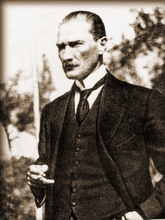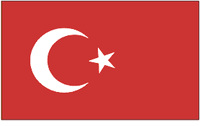Andrew Mango's exhaustive review of the events leading to the establishment of modern Turkey makes clear why its capital ended up in Ankara, far from Istanbul. In the post World War I era, it was hard (poor roads) and dangerous (bandits) to get to. Istanbul was occupied by the Allies.
With hundreds of years of Ottoman roots planted in Istanbul, it's understandable why Atatürk would want to make some other city the new seat of government even after independence was one. It was an effective way of marking the start of a new era.
Speaking of independence, Atatürk said in a speech in Ankara 1920 "that while one had to work form the roots upwards to build a solid organization, at the start one had no choice but to work from the top downwards, since until individuals had learnt to think for themselves, masses could be manipulated."
Quite true.
Saturday, June 14, 2008
Tuesday, June 10, 2008
A National Secret
I'm taking a break from the tedious work of tiling a closet. Technically, this kind of tiling—peel and stick—is easy. However...the closet is not a perfect square or rectangle. Plus, the threshold from the living room threw off my line of attack, forcing an additional set of cut tiles to fit neatly along the wall. Then there was the chore of cutting pieces to fit around a hot water tank.
All that in a tight, cramped space. It made me feel better about the good money I paid professionals to tile my kitchen and bathroom. Well worth it!
Anyway, on to my topic tonight.
Andrew Bey reports...
All that in a tight, cramped space. It made me feel better about the good money I paid professionals to tile my kitchen and bathroom. Well worth it!
Anyway, on to my topic tonight.
Andrew Bey reports...
Mustafa Kemal said in 1927 that it was immediately clear to him that the monarchy would be the relentless enemy of the national will. But to spell out the...inevitability of a republic...would frighten people who found the prospect contrary to their traditions, their mental capacity and their mentality. In order to preserve unity in the struggle for independence, Mustafa Kemal was obliged to keep to himself as 'a national secret the great capacity for development which I discerned in the nation's conscience and future.'The philosopher-king idea and its problems come to mind. The report continues...
In a conversation which occupied the night of 7/8 July (1919), Mustafa Kema is said to have allowed Mazah Müfit to note down five long-term objectives:Personally, I appreciate the last item. At the same time, I look forward to learning about what must have been a tumultuous period while the nation's language was changed!
- the proclamation of a republic
- 'appropriate treament' of the dynasty
- abolition of Islamic dress for women
- and a ban on wearing of the fez by men,
- and the introduction of the Latin alphabet
Monday, June 9, 2008
Mobilizing Resistance
In 1919, Mustafa Kemal faced a number of obstacles to building resistance. At the same time, he also had some opportune factors. Andrew Bey reports...
Now, that's on the tiny scale of my particular career experience. When I pause to think about it on the historic scale of Mustafa Kemal's effort for Turkey, I am in awe.
The army had a cadre of patriotic officers ready to defend the country. But although they were united by a common ideal, they were divided by personal and professional jealousies. The forces at their disposal were woefully weak and ill-equipped. What is more, officers were conditioned to obey orders, ultimately from Istanbul. Fortunately, the general staff was sympathetic to the national cause. Fortunately also, the best officers had developed a spirit of initiative, first in the revolutionary struggle against Abdülhamit and then in foreign wars. The civil service too did not lack patriotic officials, but initiative had been sapped out of them. To survive, they had to lie low and do as they were told.There is much more to the report, of course. I highlight this passage because the part about initiative being sapped out of a group of people, of lying low and doing as they're told echoes what I see too often in the modern American workplace. It takes a special effort to maintain a spirit of initiative, to stand up to the forces that seek to stifle that spirit. It's difficult but well worth the effort.
Now, that's on the tiny scale of my particular career experience. When I pause to think about it on the historic scale of Mustafa Kemal's effort for Turkey, I am in awe.
Subscribe to:
Comments (Atom)

